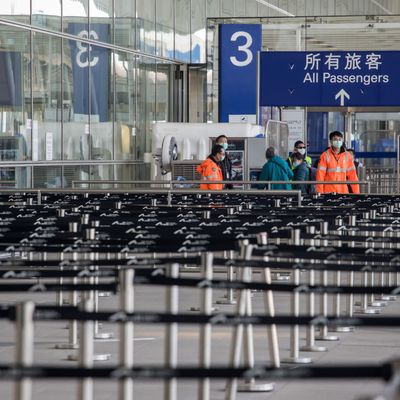
Booking Holdings — one of the two major online travel agency companies, which owns brands Priceline, Booking.com, Agoda, and Kayak, among others — announced on Wednesday that it expects customers to book 5 to 10 percent fewer hotel-room nights through its sites this quarter than they did in the first quarter of 2019. They expect the total volume of bookings in dollars to fall even more because hotel-room rates are falling with weak demand.
That announcement is even rougher than it sounds because Booking executives also said hotel-room bookings in January were up compared to a year earlier, and bookings to date in February are about flat. While they did not formally break out numbers by month, that implies an expected decline of 15 percent or more in room bookings for March compared to a year earlier. And as the outbreak continues to intensify, that could get worse.
Usually, public companies give periodic guidance to investors about how they expect their businesses to perform over the current quarter and coming year. But in the travel sector, a lot of companies have simply been saying they don’t know how much coronavirus will hurt profits. On Tuesday, United Airlines withdrew its earnings guidance for 2020, citing “heightened uncertainty surrounding this outbreak, its duration, its impact on overall demand for air travel and the possibility the outbreak spreads to other regions.” As of 10 a.m. Thursday, United stock is down 15 percent since Monday’s close.
Sabre, a former American Airlines subsidiary that runs the reservation systems for many airlines, said Wednesday that coronavirus would materially impact its earnings, but it couldn’t say how materially. Sabre stock fell 16 percent on Wednesday. Marriott International — which is now largely in the business of managing and franchising hotels, not owning them — said Wednesday that it will lose out on $25 million in monthly fee revenue “assuming the current low occupancy rates in the Asia Pacific region continue, with no meaningful impact outside the region.” Of course, Marriott isn’t claiming that’s a good assumption, which is why the company also says it “cannot fully estimate the financial impact from the virus, which could be material to first quarter and full year 2020 result.”
The earnings outlook is uncertain for travel companies because travelers’ behavior is uncertain. Take the airline sector: On some airline routes, demand has fallen dramatically and airlines are cutting flights. For example, Hawaiian Airlines is suspending service to South Korea while Delta is significantly reducing its schedule there. But on other routes, travelers may simply be delaying their decisions to book because they want to wait and see whether they feel safe traveling closer to their intended travel dates. JetBlue has responded to this impulse by eliminating change and cancellation fees on tickets booked through March 11 for travel through June 1. The airline is hoping you will go ahead and book that trip you were thinking about if you know you have the flexibility to change your mind. If this epidemic continues to spread, it may need to extend that offer, and you may see some other competitors copying it.
While the travel sector is hit harder than average, almost the entire stock market is down substantially this week. Declining travel is both a symptom and a cause of broader economic problems: Less travel means canceled business trips, meetings foregone, conferences postponed. It means fewer people dining in restaurants. This is part of a significant overall hit to the world economy. Precisely how significant is very uncertain, for the same reasons that companies like United and Marriott cannot provide clear guidance about their future profits.





























